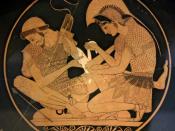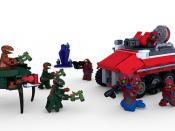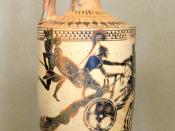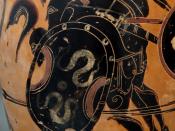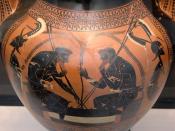Homer?s The Iliad is a story that takes place during the war between the Greeks and the Trojans. The story is told mainly from the side of the Greeks and therefore serves as a perfect display of the 3 ?Codes? of a Greek warrior. These are the Codes of Hospitality, Battle, and Household. The Greek warriors are strict upon themselves in upholding the codes as it is one of their values, and it is evident as many examples of these ?Codes? frequently appear throughout the story.
The first of the three is the Code of Hospitality, which requires the host to provide every need and desire for his guests. The Greeks fulfill this requirement time and time again without exception. With every meeting that takes place between two characters, the host always supplies for his guest or guests regardless of whether it be a friend or foe. When Priam goes to Akhilleus to beg for the body of his dead son, Akhilleus immediately says to Priam, ?Come, then, and sit down.
We?ll probe our wounds no more but let them rest, though grief lies heavy on us.? (148). Akhilleus is welcoming Priam and offers him a chair and rest above all other orders of business, and although Priam refuses, the code is still upheld as Akhilleus at least makes the gesture. Even after Akhilleus accomplishes Priam?s wish to have Hector?s body returned, he still displays generosity as he says, ?As you wished, sir, the body of your son is now set free?Now let us think of supper.? (150). Akhilleus meets his visitor?s request and still offers him supper as is stated in the Code of Hospitality. However the Code of Hospitality also declares that an exchange of gifts between host and company should occur. As the Gods counsel about the situation over Hector?s corpse, Zeus decrees that, ?Akhilleus is to take fine gifts from Priam, and in return give back Prince Hektor?s body.? (136). When the actual exchange occurs, Akhilleus? officers take ?the piled-up price of Hektor?s body? and in return Akhilleus orders ?(Hektor?s) body bathed and rubbed with oil?Then with his own hands lifting him, Akhilleus (lays) him upon a couch? (150).
When away in combat, the Greeks are still able to maintain honor and great valor by upholding their Code of Battle. The Code dictates that as a priority all dead should have proper burial. This instance is evident in Book 7 as the warriors break from battle, and ?The dead are buried during a truce.? (53). This example shows how much respect the fighters have for their fallen comrades as they enter a respite in order to hold proper burial for their deceased. The second condition of the Code of Battle is that friends and relatives are not to fight one another. When Diomedes and Glaukos come upon one another in the open field ready for combat, they discover that they are friends and restrain from battle as Diomedes says to Glaukos, ?I am your friend, sworn friend, in central Argos. You are mine in Lykia, whenever I may come. So let us keep away from one another?s weapons in the spear-fights of this war.? (45). Diomedes and Glaukos uncover the past friendship that their grandfathers had made and decide that there will be many other enemies to bring down. They exchange battle-gear with one another as a sign of their friendship and part ways peacefully. This case shows that amidst a war the Code of Battle holds strong that despite being on opposing sides friends are not to engage one another in combat.
The third and final of the three is the Code of Household. The first half of this Code pronounces that servants show undying loyalty to their master. Patroklos is a perfect example of loyalty to his master, Akhilleus. Not only is Patroklos the armor-bearer to his friend but also a servant who does his master?s bidding from fixing meals to serving guests. However Patroklos shows supreme loyalty to Akhilleus as he ultimately offers his life in combat when he dons on Akhilleus? armor to fight in Akhilleus? place. Patroklos says to his friend after appealing with him to rejoin the war and failing, ?If in your heart you fear some oracle?then send me out at least?and I may be a beacon to Danaans! Lend me your gear to strap over my shoulders? (74). Patroklos sacrifices his own life on the battlefield by taking the place of his friend and master. The second half of the Code of Household states that masters provide for their servants. The example is seen when Patroklos and Akhilleus retire for the night after meeting with the counsel of Odysseus, Aias, and Phoinix. Homer writes that, ?Patroklos went to bed at the other end, and with him, too, a woman lay?soft-belted Iphis, who had been given to him by Akhilleus when he took Skyros? (72). This event shows that Akhilleus has provided Patroklos with a woman as a gift from master to servant.
Thus, The Iliad serves as a prime subject for presenting the 3 ?Codes? of the Greek warriors. The Greeks are portrayed as men who strongly believe that the Codes of Hospitality, Battle, and Household are laws of the Gods; these Codes are not to be taken lightly and are to be upheld above all other rules. Homer maintains this idea throughout The Iliad by providing ample support and examples in the text.
Works Cited Homer. The Iliad in Western Literature in a World Context Volume 1.
Eds. Davis, et. al. Boston: St. Martin?s Press, Inc., 1995.
